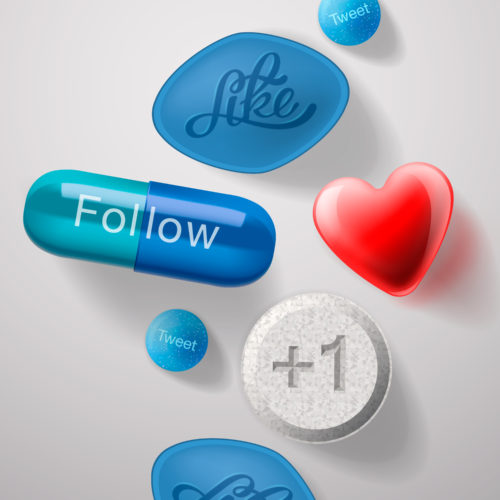Companies Are Reaping Benefits from Social Influencers, and Big Pharma Wants In
Health Letter, March 2019
By Meena Aladdin, M.S., Ph.D.

Social media is a powerful tool that has created a new landscape for interpersonal connections and communication. With nearly 2.5 billion social network users worldwide, and a projected user base of about three billion by 2021, the reach of social media outlets far surpasses that of conventional media outlets. Additionally, widespread use of platforms such as Facebook, Instagram, YouTube and Twitter has given rise to a novel type of marketing, and many companies have taken advantage of this new frontier.
The pharmaceutical industry is no exception. According to a recent STAT news article, drug companies are now seeking to hire individuals to promote their products on these social media platforms.
About social media influencing
Tapping into the ability of social media influencers to promote products can be a profitable strategy. Social media influencers are individuals who have devoted groups of followers and have established a reputation based on their knowledge in a particular topic or relationship with their audiences.
According to the STAT article, Big Pharma has found its own group of social media influencers, who are typically patients with a strong base of devoted online followers and are willing to promote a drug or other medical product. These influencers are not limited to patients; they can also be individuals who have developed a strong understanding of a disease or drug, often known as subject matter experts.
Social media influencers can have a profound effect on consumer behavior. Often trusted more than paid celebrity endorsers, today’s social media influencers provide a means for companies to build relationships with their consumers, allowing them to identify directly with other individuals with shared experiences, such as having the same disease.
According to STAT, unlike conventional influencers, pharmaceutical influencers can get paid twice: once for posting about a product, and again for prompting others to provide opinions and feedback useful to the companies. Influencers also can get paid for appearing at company-sponsored events such as seminars and panels.
Not only is this type of marketing lucrative for influencers, it is also very cost effective for drug companies. Using social media to advertise is far cheaper than other forms of advertising, such as direct mail, television, magazine, newspaper and radio advertising.
Potential pitfalls with social media advertisements
Several potential problems can arise from pharmaceutical companies marketing on social media. Importantly, the Food and Drug Administration (FDA) does not place any restrictions on who can become an influencer; anyone can be a spokesperson and promote a pharmaceutical company’s products.
STAT reported that social media influencers can be linked to pharmaceutical industries via third-party influencer talent agencies, such as WEGO Health, that maintain up-to-date rosters of influencers.
Furthermore, when a former patient becomes a social influencer for a drug company, the company can be cited for violating FDA regulations if the influencer’s social media posts fails to adhere to FDA regulations governing drug promotion, such as when Kim Kardashian West failed to fully communicate any risks associated with the morning sickness drug that she was promoting on behalf of Duchesnay. The FDA took action in this case and issued a warning letter to the drug company.
However, it is doubtful that the FDA is paying attention to the adequacy of risk information disclosures or other content in the social media postings of the many influencers who are not big-name celebrities, particularly since the FDA’s overall enforcement activities regarding drug advertising has plummeted in recent years. During the most recent three-year period (2016 to 2018), the FDA issued only 23 warning and notice-of-violation letters to pharmaceutical companies for ads or other promotional material that violated FDA regulations. This represents a sharp decline from the earliest three-year period for which data are publicly available (1997 to 1999) when the FDA issued 406 such letters.
Social media provides yet another means by which companies inundate consumers with prescription drug ads. Research previously has shown that the enhanced exposure to television ads is associated with the over-diagnosis of diseases and conditions as well as the over-prescription of drugs.[1] According to STAT, industry research similarly has shown that consumer engagement with social media related to a particular drug led to an increase in prescriptions for the drug.
Big Pharma is already moving headlong into using the breadth of social media to advertise prescription drug products. The full ramifications of Big Pharma’s use of social media remain to be seen, but it does carry with it many dangerous implications. A distinct lack of FDA oversight, combined with inadequate communication of the risks associated with the drugs being promoted, is a recipe for undermining public health.
References
[1] TV ads expand the market for statins, at the expense of the public’s health. Worst Pills, Best Pills News. September 2013. http://worstpills.org/member/newsletter.cfm?n_id=866. Accessed February 19, 2019.